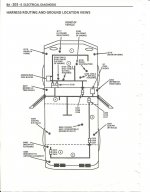F
FForward
Guest
Hi Everyone,
I'm new here posting, but have been reading all yours hoping to find a solution. I have an '89 auto that started running rough and surging. It threw a code 32 and I changed the EGR, no change at all. No codes either after changing it. I took it to a few shops and got no where. I replaced the whole fuel system, pump, filter, and injectors along with a new relay. My fuel pressure is right on and steady. I also replaced spark plugs, wires, complete distr., computer and chip. Everyone that has checked it said it was all up to specs. No one could find anything that was off. Plus there are no codes present. Gas mileage is below normal, but it runs great, and just has that little miss and surge. When it was put on a scope it showed little spikes between the larger ones. I was told it was running lean also. Some days it seems worse than others. Fuel system is new, ignition is new, vacuum lines are new, not much else to replace. It does it in both open and closed loop, so I know it can't be sensors. I did notice the air coming out of the exhaust tips seem to be less than I would think. My truck has more flow. I don't think the cats are clogged because it will rev and no loss of power at WOT. It has me and several mechanics baffled. I know several people on here have similar problems as mine, but haven't seen where they solved the problem. Could the ESC be the problem, or the MAF? I am at my wits end with this. I'm afraid to drive it any distance for fear it will quit on me and not restart. That only happened once and it was the injectors at fault. Its starts good and runs good, but is not right. Stopped at a light it will miss slightly, then surge, it feels like someone bumped me in the rear when it does. Hasn't quit on me but I don't trust it. Can anyone shed some new light on this, or have any suggestions. Gm mechanics are unable to find it, hope you guys can help me.....thanks for any info you might have....your my last resort. I know you guys are very good at solving problems and this is a great forum.
I'm new here posting, but have been reading all yours hoping to find a solution. I have an '89 auto that started running rough and surging. It threw a code 32 and I changed the EGR, no change at all. No codes either after changing it. I took it to a few shops and got no where. I replaced the whole fuel system, pump, filter, and injectors along with a new relay. My fuel pressure is right on and steady. I also replaced spark plugs, wires, complete distr., computer and chip. Everyone that has checked it said it was all up to specs. No one could find anything that was off. Plus there are no codes present. Gas mileage is below normal, but it runs great, and just has that little miss and surge. When it was put on a scope it showed little spikes between the larger ones. I was told it was running lean also. Some days it seems worse than others. Fuel system is new, ignition is new, vacuum lines are new, not much else to replace. It does it in both open and closed loop, so I know it can't be sensors. I did notice the air coming out of the exhaust tips seem to be less than I would think. My truck has more flow. I don't think the cats are clogged because it will rev and no loss of power at WOT. It has me and several mechanics baffled. I know several people on here have similar problems as mine, but haven't seen where they solved the problem. Could the ESC be the problem, or the MAF? I am at my wits end with this. I'm afraid to drive it any distance for fear it will quit on me and not restart. That only happened once and it was the injectors at fault. Its starts good and runs good, but is not right. Stopped at a light it will miss slightly, then surge, it feels like someone bumped me in the rear when it does. Hasn't quit on me but I don't trust it. Can anyone shed some new light on this, or have any suggestions. Gm mechanics are unable to find it, hope you guys can help me.....thanks for any info you might have....your my last resort. I know you guys are very good at solving problems and this is a great forum.







